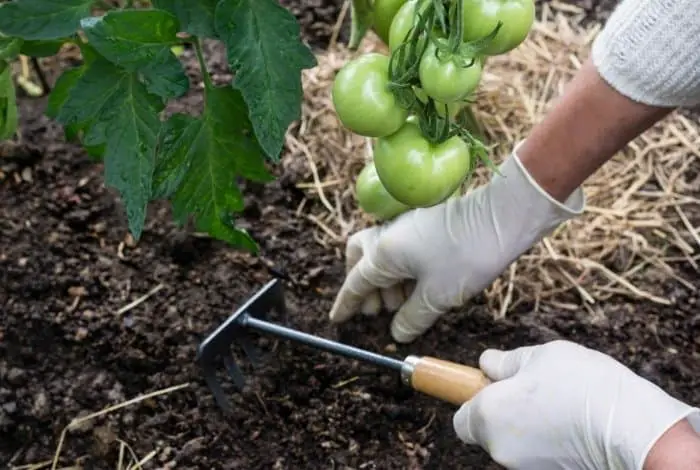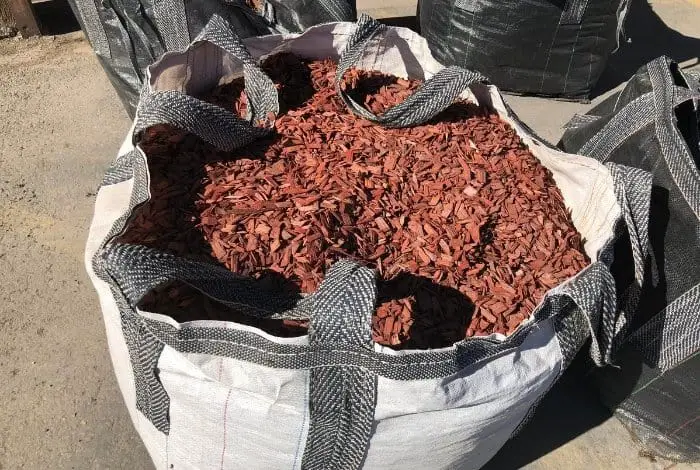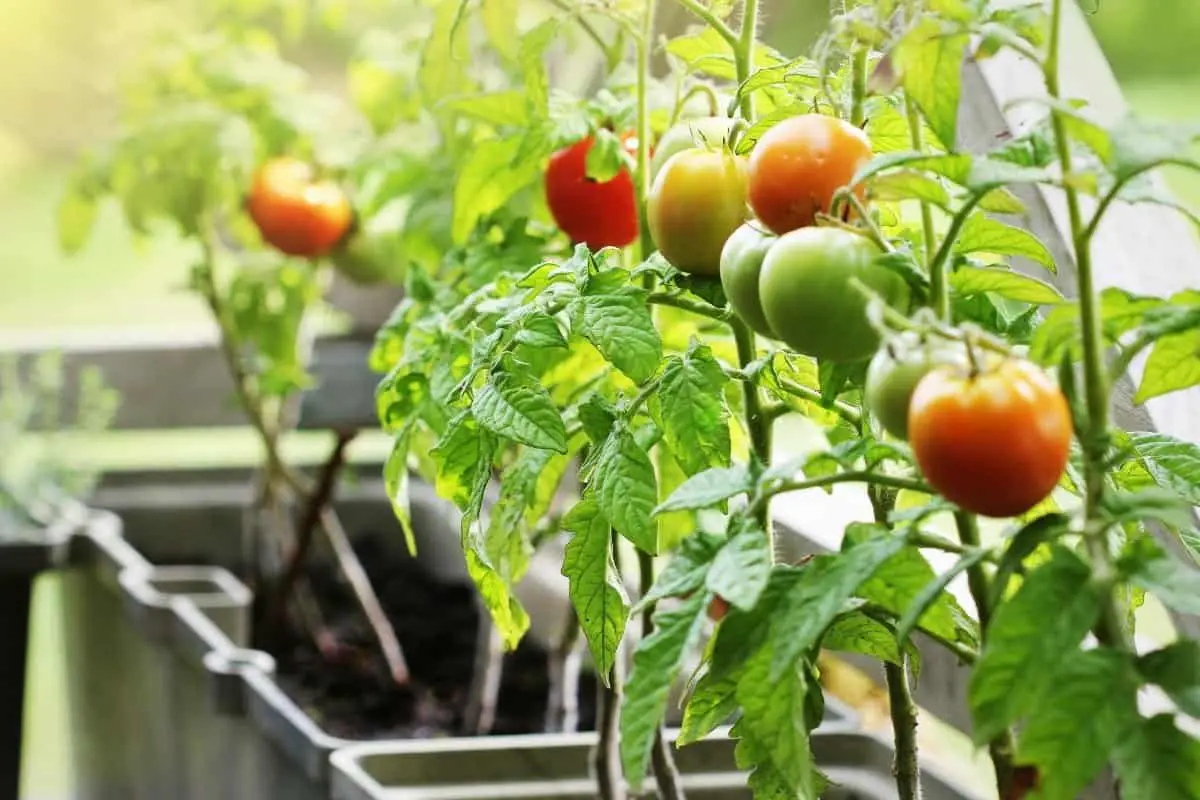Last Updated on January 31, 2023 by Griselda M.
For many farmers, the big question remains, what is the best mulch for tomatoes in pots? Container farming has become quite popular, with farmers opting to plant in a controlled environment.
Mulch is the most essential part of keeping plants thriving, especially tomatoes and peppers. Tomato plants that have mulch produce more branches and make use of the nutrients more than those not mulched. Tomato mulching guarantees you healthier, vigorous tomatoes with a higher yield.
Tomatoes are some of the easiest crops to grow. With a little more effort, you can get an outstanding harvest of homegrown juicy tomatoes. If you are worried about where to grow your tomatoes, worry no more! Tomatoes can grow in bags or containers. Water them once every week and they will produce some of the biggest harvests.
Will Mulch Hurt Tomato Plants
A lot of people want to know the answers to the question, will mulch hurt tomato plants? The simple answer is no, mulching tomato plants will not hurt or damage them as it is actually recommended to maintain healthy growth. The application of mulch is also beneficial as it suppresses the growth of weeds, insulates the plant, and increases moisture retention properties in the soil.
However, it is essential to note that while adding mulch to tomato trees is good, you must also ensure that the stems of the plant do not come into contact with it. Additionally, applying the proper mulch for tomatoes and timing the application is also vital to your plant’s growth and health. But all in all, when it comes to protecting your plant from temperature changes and other vital aspects, mulch will do your tomato plants good rather than harm them.
Benefits of Mulching Tomato Plants
The benefits of mulching tomato plants are plenty. The application of mulch over garden or pot soil proves effective in protecting your tomato tree from the harsh rays of sunlight. This is an important factor to consider, as direct sunlight for extended hours ultimately reduces soil moisture which is often caused by evaporation. Keep in mind that several tomato plant varieties yield large fruit that has weight.
When you make use of mulch around your plant, it serves as a layer of protection to keep the low-growing fruit healthy. This is because when the tomato plants droop because of the heaviness of the fruit, they will eventually touch the bare ground, which can cause them to rot. To avoid this from happening, a generous application of mulch is recommended.
Here are a few benefits of mulching tomato plants that you should take note of:
- The damages caused by heat are substantially reduced when using mulch.
- Weed growth is suppressed when mulch is added.
- Mulch enables the growing medium to retain moisture efficiently, which is beneficial to tomato plants.
- Mulch keeps the soil cool and aerated and increases tomato plant root health.
- Soil erosion is reduced because of the protective mulch layer, as rain will not directly impact it.
- Mulch is also efficient at insulating crops in the case of extreme temperatures.
- For the provision of beneficial worm activity, soil nutrients, and soil organisms, organic mulches are the best choice.
- With the addition of mulch to your tomato plants, watering demands are substantially reduced as the soil will remain moist for longer.
Is Straw Mulch for Tomatoes Good?
If you’re wondering about the answer to the question, is straw mulch for tomatoes good, then take note of the following information. To start, you would be glad to know that straw works as an effective mulch for tomatoes and peppers, amongst others. However, when applying straw mulch, it should be done with caution. So, ensuring that the straw does not come into contact with the tomato plant foliage and stems is essential to reduce the chances of any fungus build-up. When people ask me what is the best mulch for tomatoes in pots, straw is what first comes to mind as it works effectively in retaining moisture, insulating the plant, and aerating the roots.
Is Pine Bark Mulch for Tomatoes Beneficial
Is pine bark mulch for tomatoes beneficial? Yes, the application of pine bark mulch for acid-loving plants like tomatoes is highly recommended. The reason for this is because of how efficient pine bark mulch is when it comes to preventing soil-borne diseases and other conditions that can flaw your tomatoes. Pine bark is also lightweight, which is great for allowing air to pass through and reach the growing medium, whether you have planted your tomatoes in pots or the ground. Additionally, soil temperatures will be effectively controlled in hot or cold weather when pine bark is generously applied on top of the soil.
Here are a few essential tips to follow when using pine bark mulch for tomatoes:
- – Before adding pine park mulch to your tomato plants, ensure that you first test the soil pH levels.
- – Adding two to three inches of mulch for each tomato plant would prove beneficial.
- – You could also opt to use pine needle mulch which works just as effectively for tomatoes.
- – Although pine needles may slightly adjust the soil pH when added to tomato plants, it does not change it drastically if moderately applied, so you shouldn’t worry. However, if you want to enhance soil acidity, then a generous application would prove fruitful.
- – The use of pine bark mulch around your tomato tree will also reduce blight, usually caused by splashes of soil and water on the lower leaves.
Why Should You Mulch Your Tomatoes?
There are several reasons why it’s important to mulch your tomatoes. Here we discuss some of the major ones.
Regulates the Soil Temperature
Mulch helps control the soil temperature. During the hot season, it keeps the soil cool, and during the cool weather, it keeps it warm. Cold soil prevents the roots from absorbing the nutrients and the water they need. Hot soil causes the plants to die.

Improves Soil Health
Organic mulching decomposes into the soil improving its health of the soil. The tomato plants can get micro-nutrients and minerals from the decomposed mulch. Organic mulching also creates a home for fungi, bacteria, and beneficial worms. It creates an environment for them to thrive and allows healthier plants to grow.
Prevents Diseases
Mulching covers the soil surface and keeps the tomato plants clean and fresh. It creates a barrier between the foliage of the plant and the soil. This prevents them from soil-borne fungal diseases.
Keeps Soil Moisture
Mulching keeps the soil moist for longer. It prevents the water from evaporating fast during the dry season.
Saves you Water
With the soil moisture retained, you need less water to water if you use mulch.
Stops the Growth of Weeds
Mulching makes a good layer on the topsoil stopping the growth and spread of weeds.
Mulch protects your plants, encourages growth, and leads to a better harvest! Start using it and you will notice the difference.
How to Pick the Best Mulch for Tomatoes in Containers
There are a few factors to consider when selecting tomato mulch. These include:
- Source
- Size
- Characteristics
- Color– red mulch is better for tomato yields and strawberries than black ones. Color is not just a choice when it comes to the best mulch but rather an important factor.

Catch-up on The Best Soil for Tomatoes
Types of Mulch
There are two common types of mulch. They include organic and inorganic mulching.
Organic Mulch
Most small gardeners, home gardeners, and hobby gardeners prefer to use organic mulch for their tomato farming. Organic mulch includes:
- Shredded leaves
- Wood chips
- Bark chips
- Alfalfa hay
- Cardboard or newspaper
- Straw
- Hay
- Old carpet of natural fibers
- Leaf mold
- Grass clippings
- Pine straw
Inorganic Mulch
It is commonly practiced by large-scale productions like commercial tomato growers. Inorganic mulch includes:
- Red plastic
- Landscape fabrics
- Black plastic
Differences between Types of Mulch
| Organic Mulch | Inorganic Mulch |
|---|---|
| Best for home gardeners | Suitable for commercial farmers |
| Less expensive if the resources are free around the home | Highly expensive |
| Saves water | Saves less water |
| Increases soil health | With constant use, it gradually decreases soil health |
| Attracts termites, bugs, and the earthworm | Does not attract pests |
| Come from living matter | Bought from gardening stores |
| You have to provide this mulch each planting season | You can reuse this mulch in the seasons to come |
When is the Best Time to Mulch Tomatoes in Containers?
There is a right time to mulch your tomatoes. You should transplant when the night temperature is above 55 degrees Fahrenheit for better root development.
After transplanting, allow the soil to warm for some days about 1-3 weeks. Or until the night temperature is 60 degrees Fahrenheit to start mulching. Mulching before the soil warms up delays tomato flowering thus fruiting with weeks or even up to a month.
What is the Best Mulch for Tomatoes in Containers?
Having looked at the benefits of mulch and when to lay it, let’s look at the best mulch for tomatoes in containers.
FibreDust COCO Mulch
It comes as a compressed mulch block manufactured by crushing coconut husks. Coco mulch made from 100% coconut husks does not contain additives and has many benefits over bark mulch. Unlike the bark, coco does not float on surfaces and thus can be used on sloppy surfaces. Coco mulch contains high lignin content that causes it to last longer than most mulch.
Pros
- It outlasts bark mulch giving you up to three years of use without refreshing
- Use only a small portion – This block expands after hydration to cover more space.
- Comes with a rust-like color that adds color to your containers.
- Perfect for any mulching job
- Does not attract harmful insects
Cons
- It is toxic to pets
- Quite costly compared to the size
100% Natural Cedar Shavings Mulch
This mulch is suitable for outdoor and indoor potted plants, hanging planters, and other gardening pots. It controls weeds and holds moisture in the soil. Cedar’s smell is unique and subtle. It does not absorb moisture and any unpleasant odors.
Pros
- It is made in America
- Made from 100% natural cedar
- Still works as an air freshener when you use it in indoor containers
Cons
- The chips are like tiny cedar shavings
Better Reds Mulch Film for tomatoes
This mulch film increases tomato yield by up to 20%. It does so by reflecting its red light onto plants thus stimulating growth. This film retains moisture, controls weeds, and warms the soil. This mulch film can also be used for strawberries, melons, and other fruit crops above the ground.
Pros
- Increases tomato yield by up to 20% against the black film
- Uses its red-light reflection to stimulate growth
- Can be reused in future growing seasons
Cons
- It may retain too much moisture which could damage the tomatoes.
Takes Home
Gardening whether in a garden or in containers is a lot of work. Your efforts will be crowned by using the right knowledge and tools. Mulching is one of the simple tools that bear outstanding results. You can increase your tomato production and protect your plants from disease by using this simple trick. Don’t be left behind!
FAQs
What kind of mulch should I use for potted tomatoes?
The most common types of mulch include straw or hay, wood chips or bark chips, crumbled leaves or pine needles.
Is cedar mulch OK for tomatoes?
Cedar mulch is a porous material, as it has a plentiful amount of small holes that provide micro-oxygen and nutrients to the soil. It also blocks water from being absorbed by the ground, making cedar mulch ineffective for vegetables that require moisture.
Should you put mulch on top of tomato plants?
Mulch is a material used to retain moisture and prevent weeds from growing. It is often used in landscaping and gardening to prevent the roots from drying out. While the mulch will help tomatoes grow better, it may not be worth the hassle for smaller plants if it is too much for them.
What should I add to my soil before planting tomatoes?
In general, adding compost to your soil before planting tomatoes will improve the quality of your soil and help prevent problems during the growing season. Adding organic matter to your garden bed, such as a layer of compost, will also help prevent diseases between plants by creating a healthy growing environment for them. For those with sandy or clay soils, adding sand or clay to the top layer of your soil before planting can also help create better conditions.
Is pine Needles good mulch for tomatoes?
Pine needles are not the best mulch to use for tomatoes. Pine needles are typically acidic and will cause iron deficiency in tomatoes.
Tomatoes need soil that is slightly alkaline or neutral, which is not what pine needles provide. Additionally, pine needles will encourage weed growth and may not decompose quickly enough to prevent pest infestations.
Pine needles can be used as mulch but should only be used under other types of mulches like hay or straw because the acidity of the pine needles can be too much for tomato plants to handle on their own.
Is wood mulch bad for tomatoes?
Some people believe that wood mulch is bad for tomatoes because it can cause uneven watering and drainage. And as a result, they don't want to use wood mulch at all.
But as it turns out, this belief is as old as the hills. In reality, there is no scientific evidence that proves this. A few studies have been done on the topic and found that there was no difference in tomato plants grown with or without wood mulch.
Therefore, if you want to grow a healthy garden with a lot of tomatoes, you should not deprive them of their most valuable fertilizing agent - wood mulch!
Can I put sawdust around my tomato plants?
Sawdust is a great way to amend the soil in your garden. It is often used in gardening to provide nutrients for plants.
It is important to note that sawdust only works on organic-based soils. A lot of people have found that adding sawdust to their gardens can help improve the drainage, aeration, and fertility of the soil. Sawdust may also help retain water by keeping it from evaporating into thin air while also allowing it to soak into the ground more easily during rainstorms.
Find more information about Are Pine Needles Good Mulch For Tomatoes?
Caroline is a gardener who loves to get down to the nitty–gritty of gardening. She proudly proclaims herself as a ‘dirt worshipper‘ and can often be found deep in the garden, covered in soil and singing to her plants. As a self–proclaimed ‘plant whisperer‘, Caroline believes that plants need love and attention just like any other living thing, and she loves to give them both. When she‘s not tending to her garden, you can often find her researching the latest gardening trends, or teaching others how to make their gardens thrive





